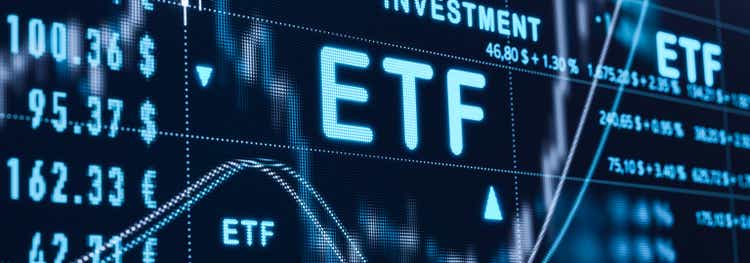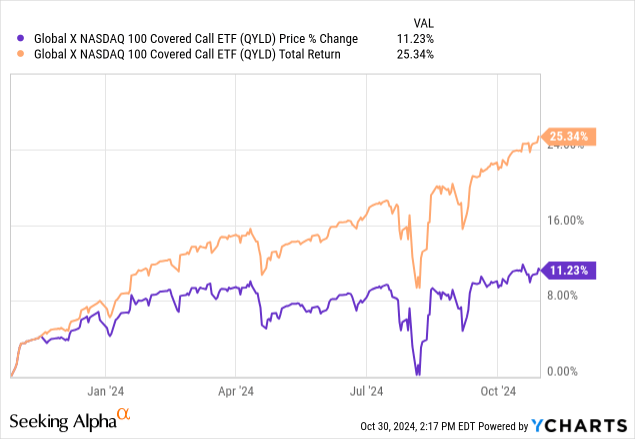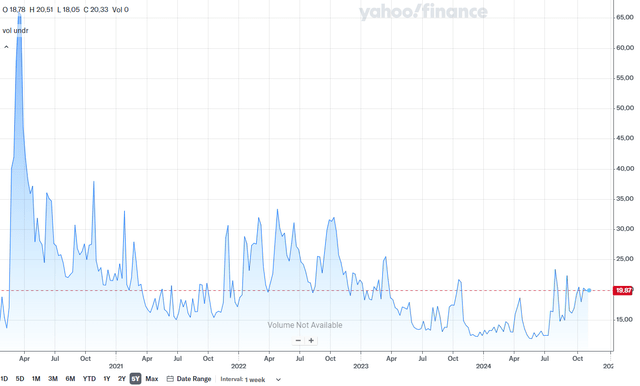- QYLD tends to outperform in an market environment where volatility levels are elevated.
- The growth outlook remains weak and political uncertainty remains, fear levels should stay elevated.
- This income based ETF should continue to outperform in the current economic and political environment.

Torsten Asmus
The financial decisions investors for dividend investors are making today have become much more complicated than in previous years. With the presidential election just a week away, rates still elevated, and growth rates remaining slow, the economic environment has become more difficult to navigate.
One of the preferred type of investment for those seeking regular income are covered-call exchange-traded funds. The Global X NASDAQ 100 Covered Call ETF (NASDAQ:QYLD) is one of the more well-known funds that uses a buy and write strategy with call options to generate regular monthly payouts for investors.

QYLD has offered investors total returns of 25.34% over the last year, and while this fund has underperformed the S&P 500 (SPY) and the Nasdaq 100 index this ETF holds, this exchange-traded fund has outperformed both indexes over the last three months.
I last wrote about QYLD in July of this year, and I rated this fund a buy. I wanted to update my coverage with the election coming up and recent economic data showing economic growth continues to remain slow. I am reiterating my strong buy rating. The US Presidential election is likely to be very close, and the aftermath of the election should produce more volatility for a number of reasons regardless of the outcome. The growth outlook in the US and abroad also remains weak, market should continue to see elevated levels of uncertainty. Geopolitical concerns are likely to remain elevated as well.
QYLD HAS $8.22 billion in assets under management, an expense ratio of .61%, and a trailing 12-month distribution percentage of 12.02%. The fund attempts to track the Nasdaq 100 Buy Write V-2 Index. QYLD sells monthly at-the-money index calls against the index Nasdaq 100 to make monthly payouts to investors.

A Chart of QYLD's Core Holdings (Seeking Alpha)
The ETF uses the same strategy each month regardless of market conditions. The fund's three largest holdings that comprise 26% of the ETF are Apple (AAPL), NVIDIA (NVDA), and Microsoft (MSFT). The income generated from selling the options is taxed at 60% capital gains, and 40% as short-term gains.
QYLD performs best when volatility levels are elevated but not so high that significant risk to the principal exists. The options premiums from the monthly contracts this fund sells are higher when fear and uncertainty levels increase, but because this ETF sell off significant upside gains while leaving downside risks unlimited, excessive volatility can hurt investors in this income-based investment.
The VIX has risen consistently over the several months, but this index still remains below 3-year average levels.

A Chart of the VIX (CBOE)
QYLD has paid out between $.16 a share and $.18 a share in income per month over the last year. This fund has also not seen any net asset value erosion since the ETF's inception date in December of 2013. QYLD's NAV is up 7.98% since the fund came to market.

A chart of QYLD's Payouts over the last 10 months (globalxetfs)
Analysts are expecting growth in the US and abroad to be slow in 2024 and 2025. The IMF is forecasting the US to grow at just 2.2% next year, and economists are also predicting China to grow at just 4.5% in 2025, which is below average for the world's second-largest economy. The weak real estate and property sector in China continues to put pressure on the country's overall economy. The market is likely to remain more volatile and range-bound in this kind of financial environment.
The presidential election should also produce additional volatility regardless of the outcome as well. If Harris wins a showdown in with Congress and between the Democrats and Republicans over Trump's tax cut, which is set to expire in 2026, will likely occur. If the former President wins the Democrats will likely use similar tactics the party used before, including opening new investigations and attacking Trump's legitimacy. The election is likely to be close regardless of the winner, and either outcome should not result in volatility levels falling significantly for any extended period of time. The geopolitical tensions in the Middle East and in Europe with wars between Russia and Ukraine, as well as the conflict between Israel and Iran, are not likely to end soon either.
Many leading tech companies are also trading at historically high valuations even as the growth outlook continues to remain weak. Apple is trading at 32 times forecasted future profits over the next 12 months, compared with an average of 20 times over the past decade, while Microsoft is trading at 33 times expected forward earnings, compared with an average of 25.
All investment theses have risks, and if the economy were to weaken substantially or if volatility levels rose excessively, QYLD would likely underperform because of the risk to the principal. If volatility levels were to fall significantly, the monthly payouts this fund makes would decrease notably as well. Still, these scenarios remain unlikely in the current economic and political environment.
Income-based investments are not designed to beat the broader indexes because these funds are focused on providing investors with substantive and consistent income. Still, while most economists are not predicting a recession, the growth outlook remains weak, and the political situation is likely to continue to be tenuous for some time. With markets likely more range-bound in this kind of financial environment, QYLD should be able to outperform and continue to offer investors solid and consistent income as well.
Comments